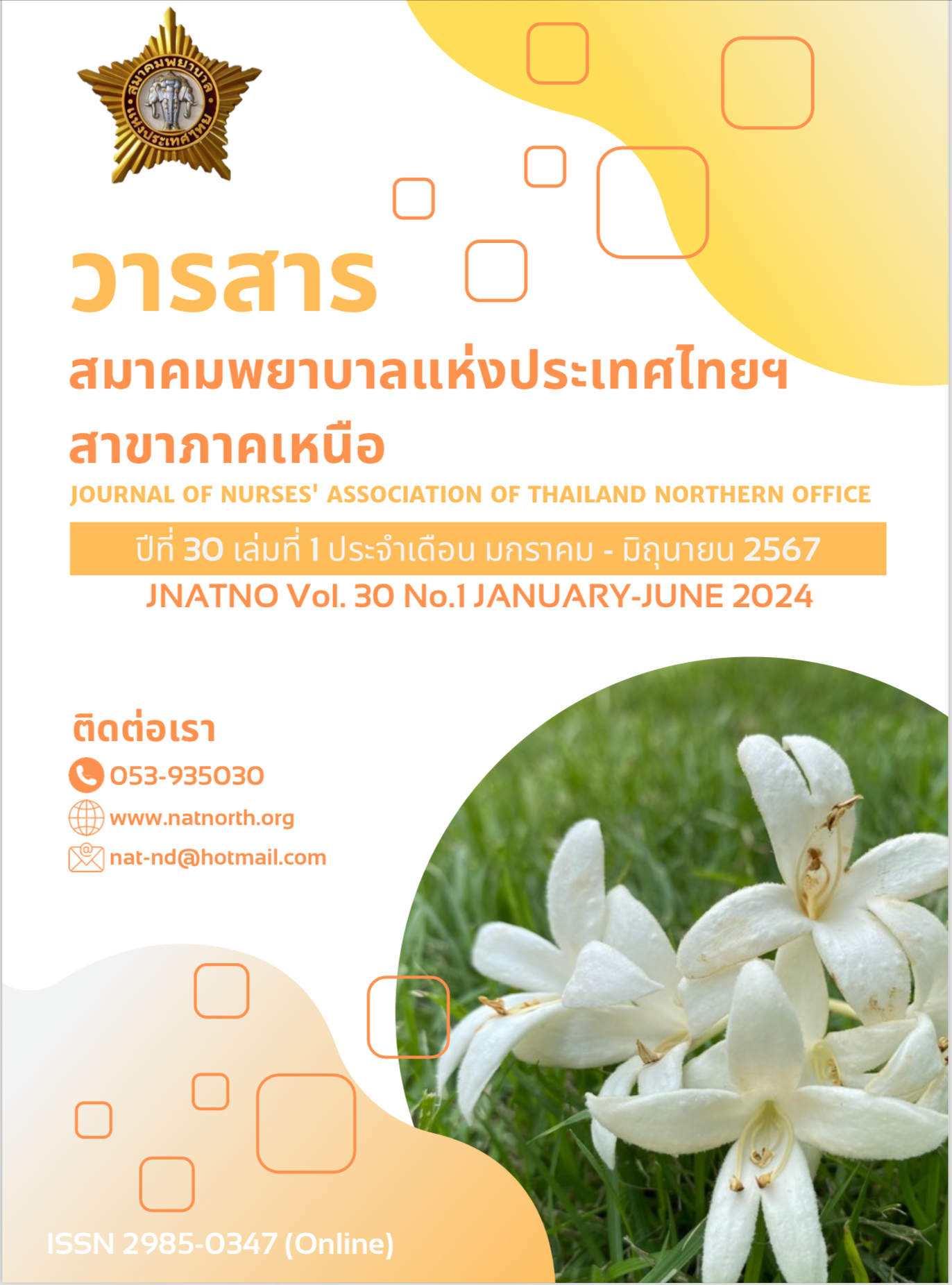ผลของโปรแกรมส่งเสริมสมรรถนะแห่งตนในการคลอดต่อความกลัวการคลอดและความพึงพอใจต่อประสบการณ์การคลอดในสตรีตั้งครรภ์ของโรงพยาบาลจุน
คำสำคัญ:
สมรรถนะแห่งตน, การคลอด, ความกลัว, ประสบการณ์การคลอด, สตรีตั้งครรภ์บทคัดย่อ
งานวิจัยกึ่งทดลองนี้มีวัตถุประสงค์เพื่อศึกษาผลของโปรแกรมส่งเสริมสมรรถนะแห่งตนในการคลอดต่อความกลัวการคลอดและความพึงพอใจต่อประสบการณ์การคลอดในสตรีตั้งครรภ์ของโรงพยาบาลจุน เป็นการวิจัยกึ่งทดลองแบบกลุ่มเดียววัดก่อนและหลังการทดลอง กลุ่มตัวอย่างคือ สตรีตั้งครรภ์ จำนวน 32 ราย เครื่องมือที่ใช้ในการวิจัยได้แก่ โปรแกรมส่งเสริมสมรรถนะแห่งตนในการคลอดแบบสอบถามข้อมูลทั่วไป แบบสอบถามสมรรถนะแห่งตนในการคลอด แบบสอบถามความกลัวการคลอดของสตรีตั้งครรภ์ และแบบสอบถามความพึงพอใจต่อประสบการณ์การคลอด วิเคราะห์ข้อมูลด้วยสถิติเชิงพรรณนา ความถี่ ร้อยละ ค่าเฉลี่ย และส่วนเบี่ยงเบนมาตรฐาน และ สถิติ Paired t -test
ผลการวิจัย พบว่า ภายหลังที่กลุ่มตัวอย่างได้รับโปรแกรมส่งเสริมสมรรถนะแห่งตนในการคลอด : 1) คะแนนเฉลี่ยของความกลัวการคลอดน้อยกว่าก่อนได้รับโปรแกรมอย่างมีนัยสำคัญทางสถิติ (p < 0.05) 2) คะแนนเฉลี่ยของสมรรถนะแห่งตนในการคลอดสูงกว่าก่อนได้รับโปรแกรมอย่างมีนัยสำคัญทางสถิติ (p < 0.05) 3) ความพึงพอใจต่อประสบการณ์การคลอดโดยรวมอยู่ในระดับมาก
ผลการศึกษาครั้งนี้แสดงให้เห็นว่า โปรแกรมส่งเสริมสมรรถนะแห่งตนในการคลอด มีผลต่อความกลัวต่อการคลอด สมรรถนะแห่งตนในการคลอด และความพึงพอใจต่อประสบการณ์การคลอด จึงควรควรสนับสนุนและส่งเสริมให้นำโปรแกรมส่งเสริมสมรรถนะแห่งตนในการคลอด ไปใช้กับหญิงตั้งครรภ์เพื่อเตรียมพร้อมก่อนคลอด
เอกสารอ้างอิง
Lowdermilk DL, Perry S, Cashion K, Alden KR. Olshansky E. Maternity & women’s health care. 11th ed. St. Louis: Mosby; 2016.
O’Connell MA, Leahy WP, Khashan AS, Kenny LC, O’Neill SM. Worldwide prevalence of tocophobia in pregnant women: Systematic review and meta-analysis. Acta Obstet Gynecol Scand. 2017;96(8):907–20.
Wigert H, Nilsson C, Dencker A, Begley C, Jangsten E, Sparud-Lundin C, et al. Women's experiences of fear of childbirth: a metasynthesis of qualitative studies. Int J Qual Stud Health Well-being. 2020;15(1):1704484.
Zar M, Wijma K, Wijma B. Pre and postpartum fear of childbirth in nulliparous and parous women. Scand J Behav Ther. 2001;30(2):75-84.
Jafari H, Courtois I, Van den Bergh O, Vlaeyen JWS, Van Diest I. Pain and respiration: a systematic review. Pain. 2017;158(6):995-1006. doi: 10.1097/j.pain.0000000000000865.
Lowe NK. Self-efficacy for labor and childbirth fears in nulliparous pregnant women. J Psychosom Obstet Gynecol. 2000;21(4):219-24.
Lowe NK. Maternal confidence in coping with labor: A self-efficacy concept. J Obstet Gynecol Neonatal Nurs. 1991;20(6):457-63.
Carlsson M, Ziegert K, Nissen E. The relationship between childbirth self-efficacy and aspects of well-being, birth interventions and birth outcomes. Midwifery. 2015;31(10):1000-7.
Salomonsson B, Berterö C, Alehagen S. Self-efficacy in pregnant women with severe fear of childbirth. J Obstet Gynecol Neonatal Nurs. 2013;42(2):191–202.
Schwartz L, Toohill J, Creedy DK, Baird K, Gamble J, Fenwick J. Factors associated with childbirth self-efficacy in Australian childbearing women. BMC Pregnancy Childbirth. 2015;15(29):1-9.
เพ็ญนภา ดำมินเศก, กรรณิการ์ กันธะรักษา, นงลักษณ์ เฉลิมสุข. ประสิทธิผลของการส่งเสริมสมรรถนะแห่งตนในการคลอดบุตรของสตรีตั้งครรภ์: การทบทวนอย่างเป็นระบบ [อินเทอร์เน็ต]. 2563. เข้าถึงได้จาก https://cmudc.library.cmu.ac.th/frontend/Info/item/dc:95210.
โรงพยาบาลจุน. เวชระเบียนสตรีตั้งครรภ์และสถิติการคลอดมีชีพ ปี พ.ศ. 2564-2566. พะเยา: โรงพยาบาลจุน; มปป.
Tanglakmankhong K., Perrin NA, Lowe NK. Childbirth self-efficacy inventory and childbirth attitudes questionnaire: Psychometric properties of Thai language versions. J Adv Nurs. 2011;67(1);193-203.
จีราภรณ์ ปราบดิน, ศศิธร พุมดวง, เบญญาภา ธิติมาพงษ์. ความกลัวการคลอดและปัจจัยที่มีความสัมพันธ์กับความกลัวการคลอดของหญิงตั้งครรภ์วัยรุ่นในไตรมาสที่ 3. วารสารพยาบาลศาสตร์และสุขภาพ. 2560;40(2):96-106.
สุรวดี คัทสิงห์. ปัจจัยที่มีความสัมพันธ์กับการรับรู้สมรรถนะแห่งตนต่อการคลอดในหญิงตั้งครรภ์แรก [ปริญญานิพนธ์ปริญญาพยาบาลศาสตรมหาบัณฑิต]. ชลบุรี: มหาวิทยาลัยบูรพา; 2561.
กมลทิพย์ ตั้งหลักมั่นคง. ความไม่สอดคล้องระหว่างความคาดหวังกับประสบการณ์จริงในการคลอดบุตรของผู้หญิงไทย. วารสารวิชาการสาธารณสุข. 2560;26(3):525-32.
Likert R. “The Method of Constructing and Attitude Scale”. In: Fishbeic M, Editor. Reading in Attitude Theory and Measurement. New York: Wiley & Son; 1967.
ธานินทร์ ศิลป์จารุ. การวิจัยและวิเคราะห์ข้อมูลทางสถิติด้วย SPSS. พิมพ์ครั้งที่ 10. กรุงเทพฯ: บิสซิเนสอาร์แอนด์ดี; 2552.
ดาวน์โหลด
เผยแพร่แล้ว
รูปแบบการอ้างอิง
ฉบับ
ประเภทบทความ
สัญญาอนุญาต
ลิขสิทธิ์ (c) 2024 สมาคมพยาบาลแห่งประเทศไทยฯ สาขาภาคเหนือ

อนุญาตภายใต้เงื่อนไข Creative Commons Attribution-NonCommercial-NoDerivatives 4.0 International License.
บทความที่ได้รับการตีพิมพ์เป็นลิขสิทธิ์ของสมาคมพยาบาลแห่งประเทศไทยฯ สาขาภาคเหนือ
เนื้อหาและข้อคิดเห็นใดๆ ที่ตีพิมพ์ในวารสารสมาคมพยาบาลฯ ถือเป็นความรับผิดชอบของผู้เขียนเท่านั้น ผู้เขียนบทความต้องศึกษารายละเอียดหลักเกณฑ์การจัดทำต้นฉบับตามที่วารสารกำหนด และเนื้อหาส่วนภาษาอังกฤษต้องได้รับการตรวจสอบจากเจ้าของภาษามาแล้ว


